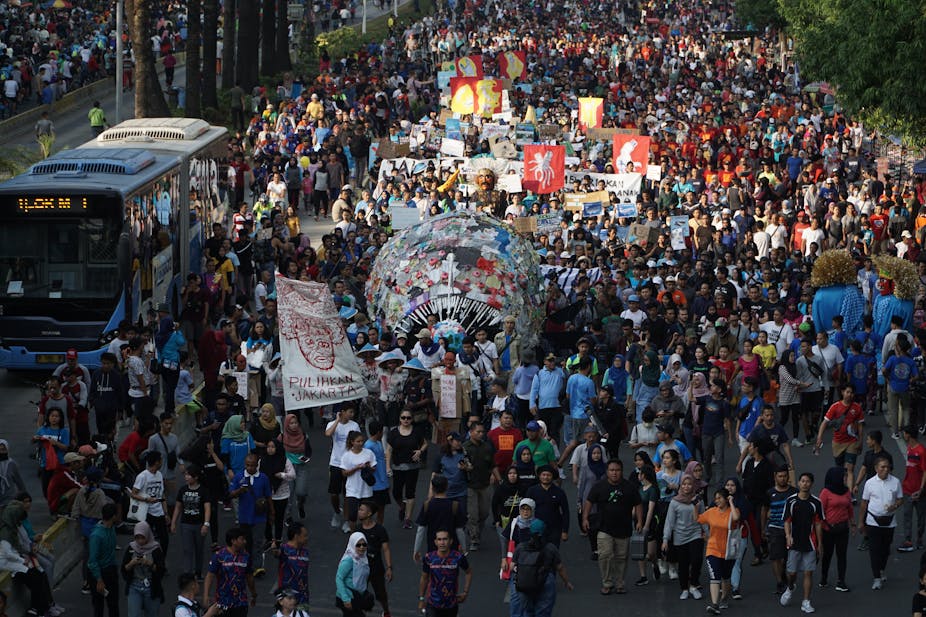Indonesia is the fourth most populous country and is on track to become the world’s fourth-largest economy in 2050. Yet it is still struggling with plastic pollution.
Among other parts of Indonesia, Bali has become one of the hotspots of the plastic pollution crisis. Bali alone produces 303,000 tonnes of plastic waste annually., accounting for 5% of the total plastic waste in Indonesia, currently the second-largest marine plastic polluter in the world.. The pandemic has even made things worse with additional usage of single-use masks and face covers mostly made from plastic.
The latest collaborative campaign to increase awareness about the hazards of single-use plastic in Bali, called Pulau Plastik or loosely translated as Plastic Island, was initiated in 2018 to address these challenges. The campaign’s key focus is to reduce single-use plastic consumption and advocate for better policies.
The campaign has been successful in raising public awareness of the danger of plastic waste, according to its 2019 impact assessment report.
However, challenges remain in turning this awareness into something real involving action by Balinese people.
After Pulau Plastik campaign
The Pulau Plastik campaign includes a four-episode video mini-series and a feature-length documentary.
The 2019 survey shows all respondents, including those in the control group (who had not watched the series), agreed or strongly agreed that plastic pollution is an important problem.
Those who watched one or more episodes of the Pulau Plastik series were more likely to “strongly agree” (84%), compared to those who had not watched (60%), that plastic pollution was an important problem. This finding also indicates that both the awareness of plastic pollution and motivation to help reduce plastic pollution are already high among communities in Bali.

While awareness and motivation levels are promising, between 32-77% of respondents reported that they still use various single-use plastic packaging.
They “often” or “occasionally” use items that have been banned (styrofoams, plastic bags and plastic straws) in Bali following the implementation of the Gubernatorial Regulation No.97/2018 on single-use plastic waste reduction.

Respondents reported their main challenges in reducing single-use plastic were due to the widespread availability and a lack of viable alternatives.

For a behaviour change campaign on single-use plastics usage reduction to result in meaningful and sustained change, it must be supported by the availability of meaningful, affordable, and accessible alternatives to single-use plastic packaging.
The policy makers should also provide local-level waste management systems and infrastructure to prevent waste leakage and pollution.
Only about half of the waste generated in Bali has been managed, with 4% being recycled and 44% transported to landfills. The rest ends up in the environment, with 33,000 tons of plastic waste going into the sea every year.
As the waste management systems are gradually strengthened to prevent further waste leakage, reduction of plastic waste inputs becomes necessary to ensure the current system can keep up. However, the phase-out of single-use plastic — a significant contributor to the waste — remains a challenge. Mainly associated with its convenience and widespread use.

A growing movement
While challenges continue, positive progress has nonetheless been made in Bali.
A study conducted by The Indonesian Plastic Bag Diet Movement (GIDKP), Nexus3 Foundation, and Bali’s Environmental Protection and Management, showed that there was a 50%-reduction in the usage of plastic bags, straws, and styrofoam one and a half years after the Gubernatorial Regulation No.97/2018 had been enacted.
Many local initiatives are also becoming parts of the movement to address the plastic pollution crisis.Many villages in Bali have enacted local regulations — (awig-awig) — that focus on plastic waste reduction.
Some villages focus on effectively managing their waste. Taro village, for example, is collaborating with Merah Putih Hijau initiative to build a community-owned sustainable waste-management system.
New businesses across Bali that provide products and services that use less or zero single-use plastic are also growing in both number and popularity.
In 2019, the Mayor of Denpasar issued Regulation No. 76/2019 which effectively decentralises waste management in the city, putting responsibility for managing waste at the village level.

In the same year, Pulau Plastik — in partnership with a coalition of 49 organisations — held a plastic free parade in Jakarta. Joined by thousands of people, the parade was held to to call on the national and local governments across the country to implement better single-use plastic reduction policies.
At the time of writing, there were 54 cities/districts and 2 provinces with plastic ban regulations in place across Indonesia.
The coalition continues to advocate for better regulations to address the plastic pollution crisis. In 2021, the coalition now has more than 100 collaborators and is pushing e-commerce platforms and marketplaces to provide their delivery services with no single-use plastic packaging.
The Pulau Plastik documentary released in cinemas earlier this year showed audiences the scale of the plastic pollution crisis in Indonesia. Audience surveys showed that the film led to an increased awareness that the main solution to address this crisis is by reducing the usage single-use plastic in the first place.
Now, meaningful efforts are needed to turn that knowledge into action. For businesses — big and small — this means providing consumers with viable alternatives to single-use plastic packaging.
For governments — national and local — it requires the implementation and enforcement of regulations around single-use plastic and effective waste management so that we can realise the possibility of a future without single-use plastic and ending the plastic pollution crisis.

